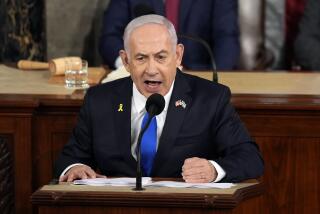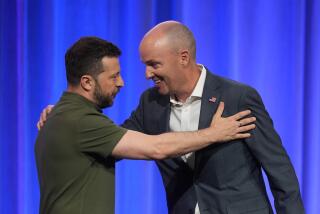Arafat Asks U.S. Lawmakers for More Aid : Congress: Onetime critics are among those who hear Palestinian leader’s pitch. But he obtains no promises.
WASHINGTON — Palestinian leader Yasser Arafat appealed for economic support for his newly expanded government Friday, meeting on Capitol Hill with some of the U.S. lawmakers who just a few years ago thought of him only as a terrorist.
The chairman of the Palestine Liberation Organization, who now likes to refer to himself as president of the Palestinian Authority, met members of the Senate and House at separate gatherings sponsored by the Arab-American Institute.
Onetime Arafat critics such as California Rep. Howard L. Berman (D-Panorama City) and Rep. Gary L. Ackerman (D-N.Y.) attended the meetings. But despite the warmer atmosphere, the Palestinian leader obtained no promises of new aid.
James Zogby, director of the institute, said he and Arafat were pleased by the tone of the meetings.
“They came to talk about things that troubled them, statements he had made or they thought he had made, whether he was doing enough to stop terrorism,” Zogby said. “The questions were asked in a straightforward way and answered in a straightforward way.”
Nevertheless, Arafat is facing a tough legislative audience. Foreign aid bills trimming between 10% and 20% from this year’s funding have passed the House and Senate and are awaiting action by a conference committee to reconcile the differences. Thus there is not likely to be much money available to help the fledgling Palestinian Authority expand its reach across most of the West Bank, which it will do under the terms of an agreement signed Thursday at the White House by Arafat and Israeli Prime Minister Yitzhak Rabin.
At a conference of the world’s wealthy nations two years ago, the U.S. government pledged $500 million over five years as part of a $2.4-billion, five-year program to assist the Palestinian Authority. Some lawmakers have vowed to prevent the Clinton Administration from making good on its pledge, accusing Arafat and his government of failing to prevent terrorism against Israelis and suggesting that the PLO has billions socked away in Swiss banks.
State Department spokesman Nicholas Burns said the Administration has no information to support accusations of secret PLO bank accounts. And Rabin’s government has endorsed Arafat’s appeal for aid from the United States and other wealthy nations.
Before heading to Capitol Hill, Arafat joined Secretary of State Warren Christopher and Israeli Foreign Minister Shimon Peres in kicking off a new U.S.-Israeli-Palestinian economic commission designed to sponsor development in the Palestinian-controlled areas of the West Bank and Gaza Strip.
*
Peres said Israel has some specific ideas for commission projects, such as “industrial parks along the dividing line between us and the Palestinians--instead of putting [land] mines, we want to build occasions for cooperation.” The reference to land mines was a rhetorical flourish; there are no longer minefields between Israel and the West Bank.
Meanwhile, U.S. mediators turned their attention toward the stalled Israel-Syria peace process. Christopher plans to meet Monday in Washington with Syrian Foreign Minister Farouk Shareh to talk about steps to revive the negotiations before elections next fall in both Israel and the United States.
Shareh declined an invitation to attend the Israeli-Palestinian signing ceremony at the White House.
More to Read
Get the L.A. Times Politics newsletter
Deeply reported insights into legislation, politics and policy from Sacramento, Washington and beyond. In your inbox three times per week.
You may occasionally receive promotional content from the Los Angeles Times.










